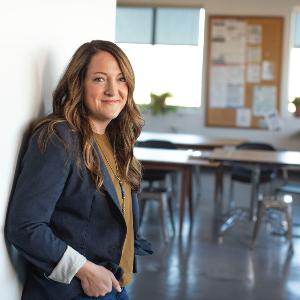PROFESS
Promoting Resilience and Optimizing Faculty Environment for Sustainable Success - The research project for a health-promoting university culture.
Promoting Resilience and Optimizing Faculty Environment for Sustainable Success - The research project for a health-promoting university culture.
We will present further findings on March 6, 2026, as part of our symposium "How healthy is the science system?" If you are interested in participating in the livestream, you can find the program and all registration details here.

Universities are an extremely competitive working environment characterized by high performance requirements, time pressure and a high degree of uncertainty. Professors in particular, as key performers in academia, are caught between research, teaching and academic self-administration. However, while many studies have looked at the challenges faced by students and young academics at (German) universities and their impact on health and performance, comparatively little data is available on professors.
Our research project PROFESS (Promoting Resilienceand Optimizing Faculty Environmentfor Sustainable Success) aims to close this gap. Based on a nationally representative survey of professors, evidence-based recommendations for action are being derived for university management and university policy in order to create an overall health-promoting environment for all status groups, including professors.
The focus here is on identifying exogenous and endogenous factors that have a significant influence on the well-being and stress levels of professors in their university working environment.
"By addressing well-being among professors, we are not only investing in the health of individuals, but also in the future viability of the entire academic system."
Prof. Dr. Yvette Hofmann, Research Project Manager

A healthy academic environment starts with the professoriate, because professors are the backbone of academia - they shape research, teaching and academic leadership. However, the growing demands on their role, including increasing publication pressure, growing administrative tasks and changing teaching formats, often lead to considerable stress and high levels of strain. Maintaining their performance is therefore highly relevant to the quality of teaching and research. It is therefore essential to design universities in such a way that they offer a health-promoting environment that supports long-term motivation, performance and satisfaction. This is precisely where our research project comes in: We want to understand which stresses are particularly significant and which measures can specifically relieve professors in their day-to-day work.
The aim of PROFESS is to develop a deeper understanding of the conditions and resources that influence the well-being (PDF, 758 KB), stress management and stress experience of professors. In particular, we are investigating
"We want to understand which factors promote the well-being of professors - and which structures may need to be adapted in order to reduce long-term stress."
Prof. Dr. Yvette Hofmann, Research Project Manager
In order to gain a comprehensive picture of the current situation, we combine qualitative (expert interviews) and quantitative research methods (online survey).
In spring 2025, we surveyed over 13,000 professors at randomly selected state universities on the topics of health, health management, and well-being in academia as part of the PROFESS study, a nationwide representative survey of professors. Of the professors invited to participate, a good 9,950 worked at universities and just under 3,470 at universities of applied sciences (HAW); of those contacted, a good 3,750 were women and just under 9,670 were men.
A total of almost 2,290 professors took part in our study, and we would like to express our sincere thanks to each and every one of them!
We greatly appreciate that so many colleagues took the time to participate in our survey! Thank you very much!
The participating faculty consists of 49.6% male professors and 33.5% female professors. 0.25% of respondents classified themselves as "diverse," and 16.6% of respondents did not provide any information about their gender. This shows that, based on the total sample, the proportion of female professors participating in this survey (18.2%) is significantly higher than that of male professors (10.5%) compared to previous professor surveys (PDF, 174 KB).
The PROFESS survey not only highlights the general working situation at German universities from the perspective of professors, but also focuses in particular on health aspects. This means that aspects such as job satisfaction, stress perception, and health are at the center of attention.
Initial evaluations show that work demands are generally considered to be high, with approximately 80% of respondents describing their work as very intense. In addition, approximately 68% of professors (fully) agree that they are often under deadline pressure (62%), that the pace of work is very high (62%), and that they have to juggle too many tasks at once (64%). These stresses are perceived more strongly at universities than at universities of applied sciences, and women report a higher overall level of stress.
This picture is consistent with the fact that around 58% of professors feel stressed (very) frequently during an average working week. Women report higher stress levels on average than men (73.8% versus 56.3%). In addition, university professors report stress more frequently than HAW professors (64.7% versus 57.5%). There are also considerable regional differences in some cases: for example, the stress perception of professors in Rhineland-Palatinate is significantly lower at 44% than that of professors in Berlin (71%).
However, despite the high levels of stress reported, overall job satisfaction is comparatively high: only 10.3% of professors are (very) dissatisfied with their work situation, while around 44% say they are currently (very) satisfied.
We will present further findings on March 6, 2026, as part of our symposium "How healthy is the science system?"
If you are interested in participating in the livestream, you can find the program and all registration details here.

© Pexels/Cowomen
In recent years, the importance of social sustainability and health has also steadily increased in the university context
In 2015, the so-calledOkanagan Charter (PDF, 972 KB) based on the UN Sustainable Development Goals and the Ottawa Charter of the WHO (PDF, 191 KB) developed. It calls on universities worldwide to embed health and sustainability in all their activities and to create a culture of wellbeing. Renowned universities such as Berkeley University of California, Cornell University and Princeton University have already integrated these principles into their statutes and are actively committed to health-promoting universities in theInternational Health Promoting Campuses Network. The first universities in Germany are also operating on this basis.
Professors in particular play a central role in education and research, but are under great pressure: multiple responsibilities, increasing academic competition and limited resources often lead to stress and strain. In the long term, this can affect not only personal well-being, but also performance and creativity.
The nationally representative survey conducted in spring 2025 provides comprehensive data on stress, resources and health-promoting university structures from the perspective of professors. The findings serve as the basis for evidence-based recommendations for action that support universities in creating a health-promoting working and learning environment. This makes an important contribution to the sustainable promotion of health and excellence in the German academic landscape.
Are you interested in further information about the project or do you have any questions? Then please send an e-mail to:profess@som.lmu.de

Prof. Dr. Yvette Hofmann
The project is headed by Prof. Dr. Yvette Hofmann.
Her research focuses on change management and well-being in academia, with a strong focus on the two topics of leadership and resilience in the higher education context. In her work, she examines how change can be successfully shaped in organizations, especially universities, and has been supporting universities in their transformation processes for almost three decades now. She benefits from her qualifications as a certified Systemic Business Coach (dvct e.V.) and Mental Health First Aider. Her expertise in mindfulness and mental training flows into both her research and teaching.

Dr. Saskia Hasreiter
Dr. Saskia Hasreiter works as a research assistant on the project.
With a background in business education and a Master of Business Research, she brings in-depth expertise in knowledge transfer and scientific research methods. Since 2019, she has been working as a research and teaching assistant at the Institute for Leadership and Organization at LMU Munich, and in 2024 she was a visiting PhD scholar at New York University Stern School of Business.
As part of her doctoral studies, she dealt intensively with the digital transformation of change management. Her research focuses on the use of digital technologies in organizational change processes, in particular data-driven change management and the development of new measurement tools.
Through her experience in interdisciplinary research projects, her analytical strength, and her commitment to practical solutions, she helps to generate innovative ideas for science and organizations.

Anne Kornmayer, M.Sc.
Anne Kornmayer, M.Sc., works as a research assistant at the Chair of Social Psychology and Legal Psychology at LMU Munich.
With a strong background in psychology and survey statistics, she is committed to research and the promotion of individual potential.
Through her work in education and research, she has deepened her expertise in questionnaire design, multivariate analysis, functional data analysis, and curriculum development. Her strengths lie in analytical thinking and communication, always with the goal of achieving continuous improvement and excellence.
She uses her knowledge to advance meaningful projects and shape progress in her field.
